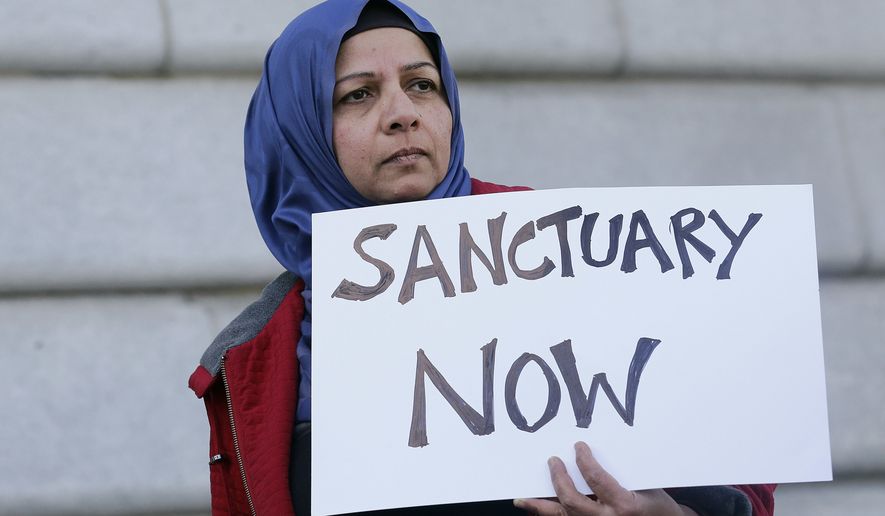The Trump administration put nine of the country’s top sanctuary jurisdictions on notice Friday that they could soon lose federal funds unless they can prove they are no longer thwarting Homeland Security’s efforts to deport illegal immigrants.
The entire state of California is being targeted. New York, Philadelphia, Chicago, Las Vegas, New Orleans and Milwaukee, Wisconsin are on President Trump’s radar, too. Cook County in Illinois and Miami-Dade County in Florida round out the list.
In letters to each of the nine jurisdictions the Justice Department said they signed documents last year, when they applied for Byrne Justice Assistance Grant money, saying they complied with a section of federal law that demands cooperation when immigration agents ask for it.
Attorney General Jeff Sessions, touring the border in California on Friday afternoon, pleaded with the state to drop its resistance.
“Forcing local law enforcement to release criminal aliens only helps violent gangs and criminals,” Mr. Sessions said. “Sanctuary jurisdictions put criminals back on your streets. They help these gangs to refill their ranks.”
Sanctuary cities are those jurisdictions that thwart efforts by deportation officers to kick out illegal immigrants. One common version of a sanctuary policy prohibits local police from alerting federal agents when an illegal immigrant is in custody, or when the illegal immigrant is going to be released. Other versions refuse all contacts.
Without communication, agents are unable to issue or follow through on detainer requests asking that illegal immigrants be held for pickup.
While the new Justice Department letters don’t detail punishments, Mr. Trump has repeatedly said that sanctuary cities could lose millions of dollars in federal grants if they refuse to cooperate on deportations.
The nine sanctuaries targeted Friday were all singled out by the Justice Department’s inspector general last year, during the Obama administration.
Rep. John Culberson, the Texas Republican who pushed the Obama administration to release its report last year, applauded the Trump administration for moving so quickly.
“Sanctuary cities have known since last summer that this day of reckoning was coming,” Mr. Culberson said. “One of my proudest accomplishments in Congress was using the power of the purse to quietly persuade the Obama administration last July to notify every jurisdiction in America that sanctuary cities would no longer be eligible for federal law enforcement funding.”
Not on Friday’s target list was San Francisco, whose sanctuary policy has been blamed for the 2015 death of Kathryn Steinle, at the hands of an illegal immigrant.
San Francisco has already sued to try to prevent any loss of money.
Despite not being on his new list, Mr. Sessions pointed to San Francisco and the Steinle case while touring the border Friday. The accused killer in that case, who had been repeatedly deported, snuck back in, and was released by San Francisco, said he was living in the city because he knew it was a sanctuary.
Immigrant-rights activists have demanded that cities resist the Trump administration, and have called on more cities to declare themselves sanctuaries.
They argue that requiring local police to turn over illegal immigrants will poison relations between authorities and minorities.
“When people are afraid to report crimes or engage with law enforcement because of immigration status, the safety of our communities is placed at risk,” said Steve Choi, executive director of the New York Immigration Coalition.
But federal officials — both in the Obama and Trump administrations — say sanctuary cities are dangerous, both to the communities who end up getting serious criminals released onto their streets, and to the immigration agents who then have to go out into the communities to arrest them.
• Stephen Dinan can be reached at sdinan@washingtontimes.com.




Please read our comment policy before commenting.